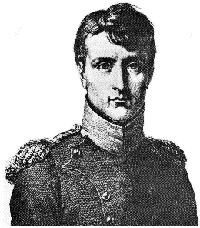
Napoleon Bonaparte (1769-1821)

Napoleon Bonaparte (1769-1821)
The history of France
and Europe during the period from 1799 to 1815 is largely the story of
Napoleon Bonaparte. Napoleon Bonaparte was born to a poor family of lesser
nobles on the island of Corsica. Because France had annexed Corsica in
the previous year, he went to French schools. Napoleon possessed a brilliant
mind, tireless energy, and tremendous ambition. Indeed, Napoleon believed
himself to be a "man of destiny."
Josephine, the First Wife
Josephine
Beauharnais was thirty-two when she first met Napoleon. She was the widow
of Vicomte de Beauharnais who had been arrested and executed at the height
of the Terror in 1794. Though she was six years older than Napoleon, she
had a youthful beauty that haunted his senses, and she represented everything
that was feminine and elegant. Napoleon's early letters to Josephine show
that he was passionately in love with her. They were married on March 9,
1796. Empress Josephine did not produce an heir. Therefore, Napoleon decided
to divorce her and marry the seventeen year old Habsburg princess, Marie
Louise. As desired, she very soon bore a little son.
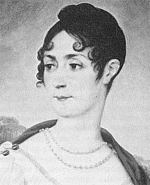
Josephine Beauharnais
![]()
Early Military Successes
Napoleon
pursued a military career, and obtained a commission as a French
military officer. Rising rapidly
to the rank of general, he was placed in command of French forces in Italy
and won brilliant victories there, thus becoming a popular military hero.
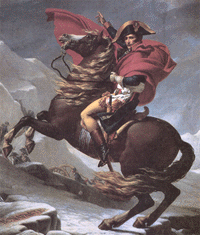
Napoleon as Military Hero
![]()
Napoleon's Rise to Power
By
1799 the French people had become weary of Revolutionary disorder and were
displeased with the corrupt and inefficient government known as the
Directory. They wanted a government
that, while safeguarding Revolutionary
gains, would be competent and orderly.
For such a government the French
were willing to accept the popular
military hero Napoleon.
![]()
The Consulate, 1799 - 1804
Napoleon
ousted the Directory by a coup d' etat in 1799. He prepared a new constitution
establishing the regime known as the Consulate. The constitution
retained the form of a republic
but concentrated governmental power in the First Consul. Napoleon ruled
as first consul, with a term of ten years. There were two subordinate consuls
who had no real authority. At age 30, Napoleon was the virtual dictator
of France. In 1802, he had himself made First Consul for life. A plebiscite,
or popular vote, overwhelmingly approved this move. Two years later, Napoleon
Bonaparte proclaimed himself "Emperor of the French."
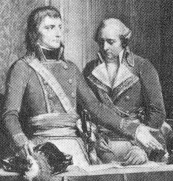
Napoleon as First Consul (left)
![]()
Emperor Napoleon I
In
1804, Napoleon changed the Consulate into an empire and crowned himself
Emperor Napoleon I. The painting (right) shows Napoleon about to place
the crown on the head of his empress Josephine. Napoleon exercised the
powers of an absolute monarch. He made the laws, decided on war and peace,
censored speech and press, and ordered arbitrary arrest and imprisonment.
While Napoleon deprived the French people of political liberty, he provided
them with an orderly and efficient system of government and accomplished
many legal, administrative, religious, and educational reforms.
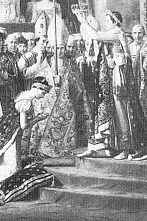
Coronation of Napoleon
A painting by
Jacques-Louis David